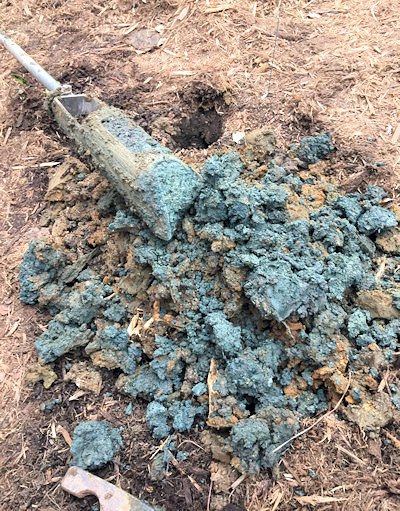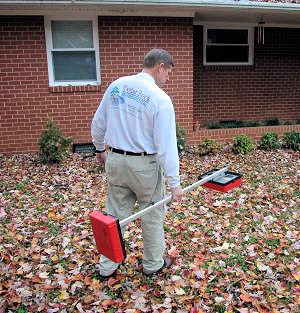Oil Tank Site Inspections
Locating Petroleum Soil Contamination
Cedar Rock site inspections locate any underground oil or gasoline tanks on your property of interest, and determine if the tanks have leaked. A site inspection also determines other site factors that determine the regulatory requirements that apply to the property.
Whether buying or selling real estate, or to safeguard the future sale of your property, a Cedar Rock site nspection is as important as having a building inspection. Previously unknown soil contamination can cause significant difficulties and delays in the sale of a property, and may also cause a loss in property value.

Discolored, contaminated soils from a soil boring beneath a UST.
Soil Contamination Must Be Reported
Keep in mind that the main issue is not the tank, but whether or not the underlying soils have been contaminated by leakage from the oil tank. Removal of soil contamination and associated environmental assessment is not required in most cases, but a leaking oil tank must be reported to the State, and regulatory requirements must be satisfied before the property can be sold.
Reasons for a Site Inspection
- Water Supply Wells - If there are water supply wells on a property, or nearby, whether in use or not, it is EXTREMELY important to check for the presence of tanks and soil contamination. State regulations will normally require the removal of a tank and the excavation of contaminated soils. Alternatively, relocation of the well or connection to city water, if available, will be required. This is expensive.
- Buyers - An essential due diligence inspection, especially when buying an older property. Prevent the unsuspecting purchase of a property with soil contamination and/or an oil tank that can continue to leak or begin leaking after you buy the property. This will avoid future expenses dur to the tank when you are the owner.
- Sellers - Establish that there is no contamination issue, or, to deal with the existence of a tank and any associated soil contamination, and to satisfy State laws prior to selling. Prevent disruption to a sale when soil contamination is discovered for the first time.
- Realtors - Guard against legal liability issues related to required disclosures, and to provide clients with high quality service and financial protection.
- Check Undocumented Work - If there is no proper documentation verifying previous tank related work, a site inspection is vital to verify what work was actually done. If an underground tank was removed without there being any documentation, it is very likely that the contaminated soil was not removed.
What to Expect (in common situations)

Cedar Rock locates hidden underground oil tanks during site inspections using a metal detector.
Cedar Rock will search for and locate any tanks on the property. When an underground tank is confirmed, Cedar Rock will flag the ends of the tank, and determine the depth below ground, dimensions, and orientation of the tank, and if possible, measure the quantity of fluids remaining in the tank. A soil boring is typically made at one end of the tank to a depth about 1-2 feet below the bottom of the tank. The soils are examined for signs of contamination and/or odor. If no contamination is apparent, a second boring is performed out at the other end of the tank. Soil samples may also be collected and submitted for laboratory analysis to confirm the presence or absence of contamination in the soils.
If there is no contamination in either sample then no further work is required. However, Cedar Rock strongly recommends that in this situation the tank be properly abandoned-in-place or removed to prevent inevitable future leakage.
If contamination is observed Cedar Rock will make recommendations for the abandonment, or depending on site factors, the removal of the tank. If site conditions indicate that soil removal may be required Cedar Rock will advise on the recommended work. If requested by the property owner, Cedar Rock will provide a proposal for the necessary work.
Aboveground tanks are inspected for signs of leakage, and if there appears to have been an oil leak from the tank, a soil boring will be made beneath the tank to check for soil contamination. Depending on site conditions and access, Cedar Rock also often inspects the crawlspace or basement of a residence for evidence of an heating oil system and leakage from the system.
A report, stamped by a NC Licensed Geologist, will be prepared for the client detailing the results of the site inspection and the recommended actions to take.
A typical inspection takes from about 30 minutes to an hour and costs as little as $400.00 depending on location. To protect your investment and provide peace of mind regarding the sale or purchase of your property of interest, please call us at 336 684-2734, or use our contact form.
See the Locating Hidden Tanks page for more information on how unknown tanks can be located.

